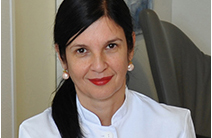Freiburg radiotherapist is new member of the Leopoldina

Prof. Dr. med. Anca-L. Grosu has since July 2018 been a member of the German National Academy of Sciences, known as the Leopoldina. Prof. Grosu is the Medical Director of the Department of Radiation Oncology at the Medical Center - University of Freiburg. Becoming a member of the Leopoldina is considered by scientists to be one of their highest honors and awards. "It is a great honor for me to belong to the Leopoldina. I am particularly looking forward to the intensive specialist exchanges with colleagues from the most diverse disciplines," says Prof. Grosu. She will be part of the radiology section.
Life and works
Prof. Grosu studied medicine in Cluj, Romania. After completing her specialist training in Munich, she became a senior physician at the Rechts der Isar Hospital in Munich in 2000. Following a year of research at Harvard Medical School, USA, Prof. Grosu became Medical Director of the Department of Radiation Oncology at the Medical Center - University of Freiburg. She was Deputy Dean of the Medical Faculty of the University of Freiburg, is a member of the Senate of the Albert Ludwig University of Freiburg, Deputy Chair of the German Consortium for Translational Cancer Medicine (DKTK) at the Freiburg site and Deputy Equal Opportunity Officer of the University.
Prof. Grosu's research interests are in the fields of biological imaging, precision radiotherapy, combined radiotherapy and immunotherapy as well as digitalization in radiation oncology. She is for example investigating how the metabolism of tumors can be visualized and how the immune system can be stimulated by radiation therapy in order to act against the cancer itself. Prof. Grosu has contributed to more than 400 publications and has patented, among other things, a method for cultivating minitumors in a Petri dish.
Leopoldina – German National Academy of Sciences
The Leopoldina, founded in 1652, is one of the oldest science academies in the world. With around 1,500 members, the Leopoldina unites outstanding scientists from Germany, Austria, Switzerland and numerous other countries. As the National Academy of Germany, the Leopoldina has represented German science in international committees since 2008 and independently appraises the scientific foundations of political and social issues. In interdisciplinary groups of experts, together with other German, European and international academies, the Leopoldina formulates public statements on current topics.
Back